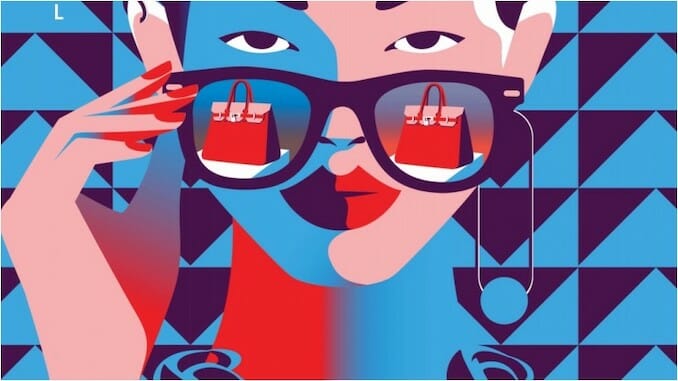Counterfeit Is a Complicated Tale of Friendship, Lies, and Knockoff Handbags

We are truly living in a time of scammers, so it seems natural that our contemporary fiction should start reflecting this trend, both in terms of the stories it chooses to tell and the way those stories are framed. Kirstin Chen’s latest novel, Counterfeit, is a story of scammers, and one in which the audience themselves may find themselves hoodwinked several times over.
On the surface, the story is a run-of-the-mill crime caper, in which two women team up to launch a manufacturing business to make and distribute counterfeit handbags. And not like the obviously misspelled Prada clutches we all used to buy down on Canal Street back in the early 2000s, but high-quality knockoffs that are (nearly) impossible to tell from the real thing. But the story ultimately turns out to wrestle with much meatier topics, from reclaiming and challenging Asian stereotypes (by having her characters use those model minority perceptions to their advantage) and critiquing the myths surrounding Chinese overachiever culture.
The story first follows Ava Wong, a straight-laced Chinese American lawyer who has never met a rule she didn’t follow. Married to a prominent surgeon and on indefinite hiatus from her corporate law job to raise her two-year-old son, her life—on the surface at least—seems pretty perfect. Underneath, however, everything is falling apart. Her husband Oli’s never home, Henri’s constant, unending tantrums have her constantly on edge, and she secretly hates the fancy law degree she never wanted to get in the first place.
Enter Winnie Fang, Ava’s former Stanford roommate who suddenly reenters her life, looking well rested, professionally physically maintained, and effortlessly rich. Ava’s stunned—and more than a bit jealous—at least until she learns that Winnie’s easy wealth comes from a complex system of fraud. Her scheme, in which her company makes fake luxury bags which she then returns for cash at upscale boutiques, before selling the genuine articles on eBay at a discounted but still tidy profit, somehow pushes every one of Ava’s good girl buttons. Winnie’s not playing by the rules. She’s cheating. And all her success is thereby tainted.
But while on an impromptu trip to China to visit relatives, Ava’s husband cancels her credit cards, leaving her no choice but to reluctantly go to work for Winnie rather than tell her gossipy family that her perfect American life isn’t actually so perfect after all. And thus a partnership is born.
-

-

-

-

-

-

-

-

-

-

-

-

-

-

-

-

-

-

-

-

-

-

-

-

-

-

-

-

-

-

-

-

-

-

-

-

-

-

-

-








































